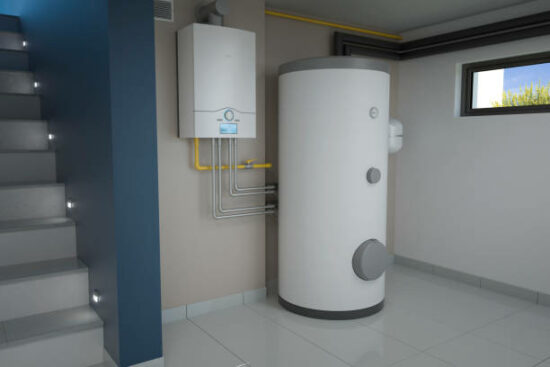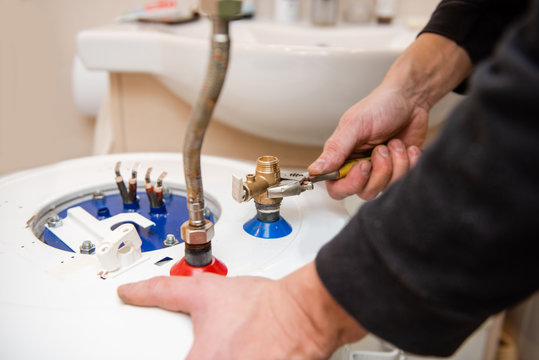Are you wondering how long a gas-hot water tank can heat up? Are you looking for ways to ensure your water is always warm and ready to go? If so, then this blog post is for you! We’ve broken down the average time it takes a gas hot water tank to heat up and some tips and tricks to help optimize your heating process.
Table Of Contents
−How Long Does a Gas Hot Water Tank Take To Heat Up
A conventional gas tank water heater, such as one powered by propane, takes 30–40 minutes to heat a full tank of water. The time it takes to recover depends on the size of the tank and the heater’s first-hour rating.

1. Types of Gas Hot Water Tanks
When it comes to heating your hot water, one of the most important decisions you can make is the type of gas hot water tank you choose. Three main gas hot water tanks are available today: conventional storage tanks, tankless heaters, and hybrid heaters.
Conventional storage tanks are the most common type of gas hot water tank; they work by storing hot water in the tank until it is needed. This means that when you turn on the hot water tap, the water is already hot, and you don’t need to wait for it to heat up.
Tankless heaters, also known as “on-demand” heaters, are a newer type of gas hot water tank. These heaters use a series of heat exchangers to heat water as it passes through the tank, meaning you don’t need to wait for the tank to fill up before you can use hot water.
Finally, hybrid heaters combine tankless and conventional storage tank heaters, utilizing both to provide a more efficient hot water solution.
No matter which type of gas hot water tank you choose, they all have one thing in common: they all take time to heat up. In the next section, we’ll look at how long it takes for a gas-hot water tank to heat up.
2. Size of Gas Hot Water Tank
The size of your gas hot water tank is important regarding how long it takes to heat up. The size of the tank determines how much water it can store and how much heat it can transfer to the water. If you have a smaller tank, water heating will take less time.
On the other hand, a larger tank will take longer to heat the water. It’s important to consider the tank’s size when deciding the best option for your home. Additionally, more insulation can help reduce the time it takes for the water to heat up.
3. Insulation of Gas Hot Water Tank
Insulation of a gas hot water tank is important to ensure that the heat is retained and energy efficient. The higher the insulation levels, the less energy will be required to heat the water in the tank. A well-insulated hot water tank will take less time to heat up, thus reducing your energy costs in the long run.
Also, a well-insulated tank will reduce the impact of temperature fluctuations in the outside environment, keeping your hot water at the desired temperature. To maximize the insulation of your gas hot water tank, ensure it is installed in a location that is sheltered from the elements and not exposed to direct sunlight.
4. Heating Capacity of Gas Hot Water Tank
One of the most important factors to consider when deciding how long a gas hot water tank will take to heat is its heating capacity. Gas hot water tanks generally have a capacity ranging from 30,000 to 50,000 BTUs per hour, depending on the tank’s size and the insulation amount.
A higher BTU capacity means more energy is used to heat the water faster. The larger the tank and the better the insulation, the higher the BTU capacity and the quicker the water will reach its desired temperature. To determine your gas hot water tank’s exact heating capacity, consult your installation instructions or the manufacturer’s specifications.
Factors Affecting Heating Time of Gas Hot Water Tank

When it comes to heating a gas hot water tank, a few factors can affect the amount of time it takes for the tank to reach its desired temperature. The size of the tank, the insulation, and the heating capacity all play a role in the amount of time it takes for the tank to heat up.
The larger the tank, the longer it will take to heat up, as the water will need more time to reach its desired temperature. Insulation helps keep the heat in the tank and can also reduce the time it takes for the tank to heat up. The heating capacity of the tank is also a factor, as it determines how quickly the tank can heat the water. A higher heating capacity will result in a shorter heating time.
Benefits of Having a Gas Hot Water Tank
Having a gas hot water tank has several advantages, the most obvious of which is the faster heating time. While electric water heaters may take up to an hour to heat up, gas hot water tanks usually take about 30 to 40 minutes. This means you can have hot water faster, making it ideal for people who need it quickly.
Gas hot water tanks are typically more energy efficient than electric water heaters, saving you money in the long run. They also tend to be more reliable, so you don’t have to worry about them breaking down unexpectedly. Finally, gas hot water tanks are generally easier to maintain, so you don’t have to worry about issues arising as often.
Safety Considerations for Gas Hot Water Tanks
Gas hot water tanks are a great option for homeowners looking for a reliable, efficient, cost-effective way to heat their water. However, it is important to consider safety when using a gas hot water tank. As gas is involved, it is essential to take extra precautions and follow the guidelines outlined by the manufacturer.
Before using the gas hot water tank, ensure it is installed and operated according to the manufacturer’s instructions. It is also important to check for leaks and ensure the connections are tight. Any leaks should be fixed immediately. Furthermore, ensure that the area around the tank is well-ventilated, as this will help reduce the risk of carbon monoxide poisoning.
When using a gas hot water tank, it is important to check the temperature regularly. The temperature should not exceed 120°F (49°C), which can cause scalding. It is also important to have the tank regularly serviced by a qualified professional to ensure that it is functioning correctly and that all safety measures are in place.
Finally, it is essential to understand the importance of having a working fire extinguisher in the vicinity of the gas hot water tank in an emergency.
By following these safety guidelines and taking extra precautions, you can ensure that your gas hot water tank is a safe and efficient way to heat your home.
Maintenance Tips for a Gas Hot Water Tank
Regular gas hot water tank maintenance is essential for keeping it running efficiently, safely, and reliably. A few simple tips can help you keep your tank in top shape and reduce the time it takes to heat it. Make sure to have your tank inspected by a professional at least once a year, and have the anode rod replaced if necessary.
Check the pressure relief valve and the temperature pressure relief valve to ensure they are working correctly. Additionally, flushing the tank regularly can help reduce sediment buildup, which can increase the time it takes to heat the tank.
Finally, clean the burner and thermocouple to help the tank heat faster. These simple steps can help keep your hot water tank running at its best.
Troubleshooting for Issues with a Gas Hot Water Tank
Troubleshooting for issues with a gas hot water tank can help you identify and solve any problems you may have with heating times. Generally speaking, the average gas tank water heater takes about 30 to 40 minutes to heat water in the tank. If you’re having trouble with heating times, check that your insulation is up to date, and ensure that your tank isn’t too large for your home’s heating capacity.
Additionally, check that there aren’t any blockages or leaks in the pipes leading to or from the tank. If none are the problem, you may need to call a professional to take a closer look. With proper maintenance and proper troubleshooting, you can ensure that your gas hot water tank heats up quickly and safely.
Final Words
Gas hot water tanks are a reliable and efficient way to heat water. With the right size, insulation, and heating capacity, it can take as little as 30 to 40 minutes to heat the water in the tank. Of course, several factors can affect this time, so it’s important to keep an eye on your tank and carry out regular maintenance to ensure it is running smoothly. Taking the time to care for your gas tank properly can prevent any issues that may arise and ensure a steady supply of hot water.

Jay
Jay is a health and wellness enthusiast with expertise in water quality and nutrition. As a knowledgeable advocate for holistic well-being, Jay successfully manages Type 2 Diabetes through informed lifestyle choices. Committed to sharing reliable and authoritative insights, Jay combines firsthand experience with a passion for enhancing health."

